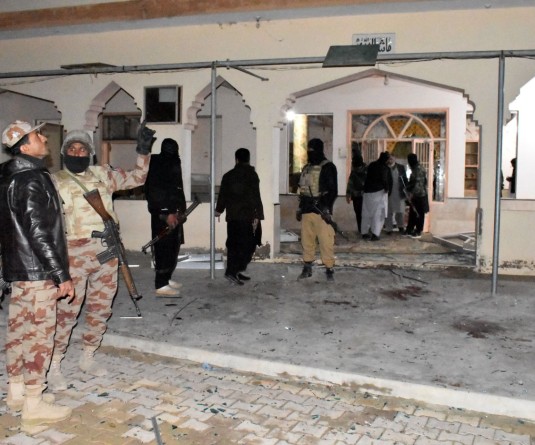A federal police officer stands guard as supporters of Rosa Verduzco protest, demanding the authorities to release her, near a home known as "La Gran Familia" (The Big Family) in the western city of Zamora July 17, 2014. Verduzco, 79, was arrested this week in an army and police raid on the refuge for abandoned or troubled children in La Gran Familia. The government said the children were living in dire conditions and that some were sexually abused. The allegations have shocked many Mexicans and Verduzco is the centre of attention, portrayed by some as a monster and others as a victim of unfounded rumours. (REUTERS Photo)
MEXICO CITY, May 28 (Thomson Reuters Foundation): A top Mexican official on Wednesday said a new campaign against domestic violence would be revised after the video ads sparked strong public opposition from critics who claimed it misrepresented the growing problem.
The initial campaign showed images of men and children, but no women, as potential victims, and one woman was shown as an aggressor, sparking criticism from activists and opposition politicians who said female victims were made invisible.
Domestic violence has been rising across Latin America, especially as coronavirus lockdowns have left many women isolated at home with abusive partners, rights groups say.
In Mexico, reports of family violence rose 10% in the first four months of the year, compared to the same period last year, according to government data.
More than 1,300 women were murdered in Mexico in the same four months, government statistics show.
In response to criticism, the head of the National Commission to Prevent and Eradicate Violence Against Women (CONAVIM) said the #CountToTen campaign was still in its initial stages and not yet formalized.
"We are going to enrich [the campaign] and make a set of spots and posters and videos with greater depth," said Candelaria Ochoa, the head of CONAVIM, in a radio interview on Wednesday.
"This first idea was launched, but it's not the campaign," Ochoa said.
The opposition Institutional Revolutionary Party (PRI) said on Twitter this week that the campaign did nothing to eradicate violence against women and should be scrapped.
One #CountToTen campaign video showed a woman getting angry at her partner, a gay male couple fighting and a man growing frustrated at his children.
A voiceover said: "Before you despair, count, count, count, count to 10."
During the radio interview with Ochoa, host Lupita Juarez said: "When a woman is being assaulted, when she's being beaten, she doesn't have time to count to 10."
Feminist collective Brujas del Mar, which organized a national women's strike earlier this year, wrote on Twitter that the government "should count to ten ... because that's the number of femicides every day in this country.".
The images were not visible on government social media or websites on Wednesday, and the Interior Ministry did not immediately respond to a request for comment.
Mexico's president has denied the rising violence against women during lockdown, contrary to official data.
Emergency calls reporting attacks on women in Mexico jumped more than 50% in the first four months of the year compared with the same period last year, government data shows.
Mexico has more than 74,000 confirmed cases of coronavirus, which has led to more than 8,000 deaths, though the real case number is likely much higher as testing is limited.






